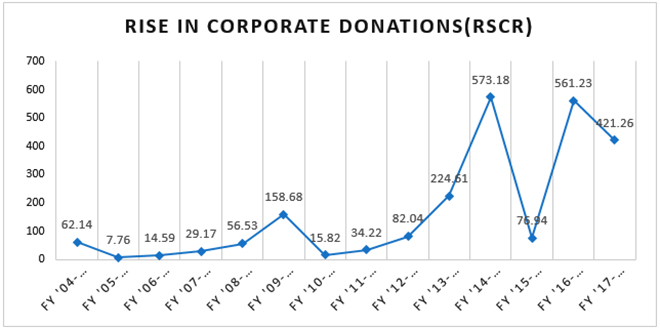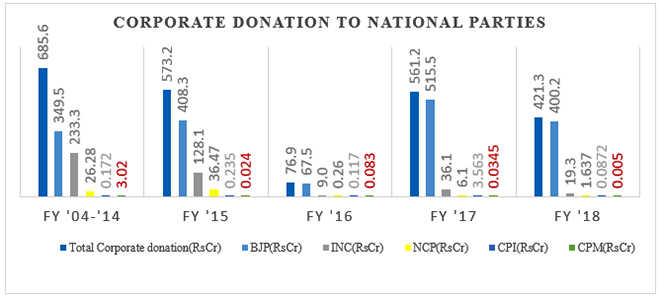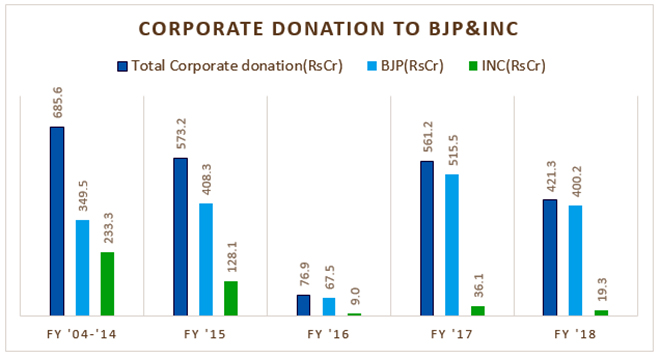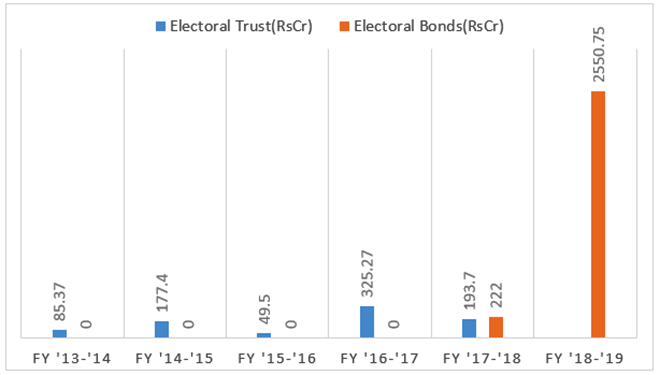How are corporates/businesses funding political parties in India? Where do major political parties stand in terms of donations from corporates and businesses?

Rahul Gandhi campaigns in Wayanad, 4 April. Photo: Atul Loke/Getty
The forthcoming Indian general elections is widely speculated to be the most expensive elections in the world democratic history. It is also likely that the 2019 general elections would have the heaviest corporate exposure in terms of political funding and influence narratives. As of now, corporate donations, which come in various forms, mainly through individual corporate/businesses contributions and electoral trusts, cover more than the two-third of total funds collected by the political parties. Corporate donations, in fact, formed 92 per cent of the Bharatiya Janata Party (BJP)’s total donations in 2017-18. This will further increase in the years to come, with the recent changes in the laws and the introduction of new tools such as electoral bonds.
Corporate funding of elections: A quick snapshot
The history of corporate funding of political parties in India goes back to the freedom movement. The Birlas were one of the leading donors of the Indian National Congress. After Independence, the business class as a whole secured some leverage over the shaping of the Congress government's economic policy. It contributed the majority of donations towards poll spending in the post-independence era. In the 1960s, the Congress and the Swatantra Party — the latter started by C. Rajagopalachari as a party advocating free enterprise — were the main beneficiaries of donations from big conglomerates such as the Tatas and the Birlas, who together accounted for 34 percent of the total company contributions between 1962 and 1968.
In 1969, the Indira Gandhi government imposed a complete ban on corporate funding (via deletion of the Section 293A of the Companies Act) to break the nexus between politics and businesses and also to check the popularity of the centre-right Swatantra Party by drying it off finances. However, this proved counterproductive. To beat the ban, political parties started raising funds by publishing souvenirs, in which advertisements were placed by the business houses. Businesses also resorted to tax evasions, black-market operations and other illegal mechanisms due to political compulsions and the threat of selective raids and nationalisation. This period also saw the rise of “briefcase politics” through which vast amounts of black money was transferred into the Congress Party account. In the era of license permit raj, this arrangement also suited the businesses. However, a forward-looking Rajiv Gandhi government, intending to end the culture of license permit raj, took a crucial decision of lifting the ban in 1985.
Recent changes on corporate funding laws
The post-liberalisation period has witnessed a steady rise in the corporate funding of elections through both the traditional route of contributing directly to political parties and through other institutional innovations like electoral trusts. A major change affecting corporate donations was brought in 2013 by amending the Companies Act. This legislation raised the earlier 5 per cent limit to 7.5 per cent, allowing corporates to donate up to 7.5 percent of the net average profits earned in the preceding three years. While this was done to allow more funding space for political parties, the 2017 Finance Act, brought by the current National Democratic Alliance (NDA), removed the earlier limit (by amending the Section 182 of Companies Act 2013). In addition, changes were made in the Foreign Contribution Regulation Act (FCRA), 2010 via the 2018 Finance Bill to allow foreign companies registered in India to make political donations.
Two other recent important developments with direct links to corporate funding are the legal basis for Electoral Trusts and Electoral Bonds. While the electoral trusts scheme was floated as early as 1996 by the Tata Group, this innovative form of corporate donations received legal sanctity in 2013 by bringing these entities under the Section 25 of the Companies Act, 1956. The electoral bonds scheme was introduced through the Finance Act 2017. It allows anyone, including corporates, to donate to political parties via electoral bonds. To sum up, laws and institutional forms related to corporate donations have gone through massive transformations since 2013.
Key trends in corporate donations
How are corporates/businesses funding political parties in India? Where do major political parties stand in terms of donations from corporates and businesses? A quick glance at the data compiled by the Association of Democratic Reforms (ADR) makes it easily discernible that in the last decade, corporate donations are on an upswing. From a measly Rs 26 crore in 2004-05, total donations through various corporate sources have climbed up to Rs 422 crore in 2017-18 (see Figure 1). Six national political parties — the BJP, the Congress, the Nationalist Congress Party (NCP), the Bahujan Samaj Party (BSP), the Communist Party of India (Marxist) and the Communist Party of India (CPI) — are the major recipients of corporates’ political generosity (Figure 2).
Figure 1. Flow of corporate donations 2004-05 – 2017-18

Figure 2. Corporate donation to major national parties

In terms of comparative figures of major parties, the BJP continues to have the lion’s share in the entire pool of corporate funding (figure 2). The ruling party has captured as much as 92% of the total corporate donations in 2017-18. To interpret this in another way, corporates/businesses donated a mammoth 12 times more money to the ruling BJP than to other national parties in 2017-18. A comparison of the two principal national parties — the BJP and the Congress — makes it even more interesting. The BJP received as much as Rs 400 crores of corporate donations while the Congress received only Rs 19 crores in 2018 (figure 3). Surprisingly, the BJP has been maintaining a complete domination over the Congress even when the latter was in power in the 2004-2014 period, while the gap between the parties have grown massively since 2013-14 (coinciding with the phenomenal rise of Narendra Modi).
One of the key reasons for this growing asymmetry in corporate donations is the fact that some of the richest electoral trusts have been donating generously to the BJP, than to other national parties (figure 4). It must be noted that the biggest share in corporate donations come from 18 registered electoral trusts. With electoral bonds (where more than 99.9% donations are from corporate donors) emerging as the popular channel of donations since its introduction in 2018, the asymmetry in corporate donations may widen to an unsustainable level (figure 4).
Reason for public funding
It is well known in political finance literature that excessive reliance on corporate funding can turn political and democratic processes into a plutocracy in the longer run. The recent changes in laws — particularly the removal of the 7.5 per cent cap in corporate donations, the amendment of the FCRA, 2010 allowing foreign companies registered in India to make political donation and the introduction of electoral bonds without the mandatory donors’ identities — are likely to push the country toward a plutocracy. And even more worrisome is the growing asymmetry in corporate donations to major political parties. This will have much more serious implications for the health of democracy in India in the near term. There is sound empirics to suggest that money plays a disproportionate role in determining election outcomes in India and elsewhere. This is the precise reason why many democracies have gone for public funding mechanisms to provide a level playing field to all political parties — big, small, old and new ones. Equity in political finance is a hallmark of a healthy democracy. It is high time Indian policy makers take note of this worrisome development.
Figure 3 Corporate Donations: the BJP vs. the Congress

Figure 4. Electoral Trusts vs. Electoral Bonds

Authored by Niranjan Sahoo, Senior Fellow, ORF and Niraj Tiwari, Research Intern, ORF

